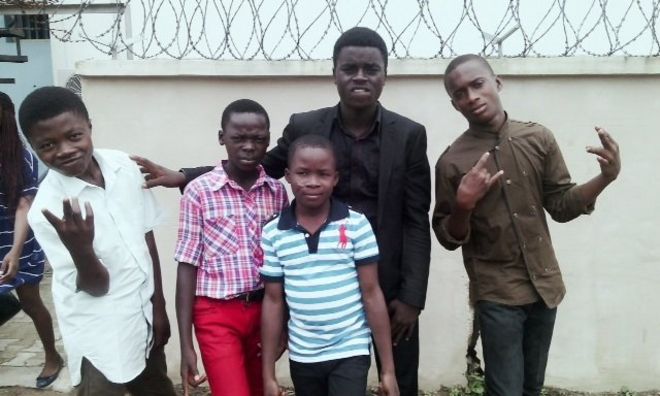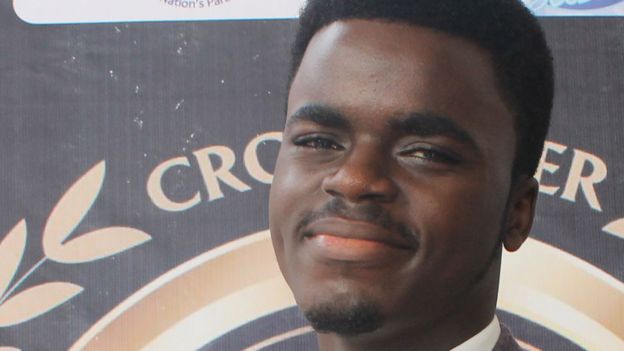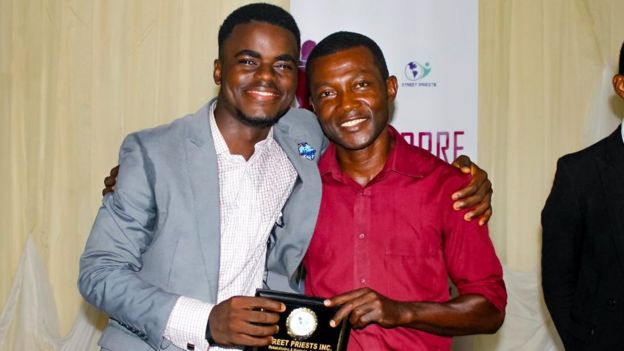The teen rescuing street children in Nigeria
 STREET PRIESTS
STREET PRIESTS
In our series of letters from African journalists, novelist and writer Adaobi Tricia Nwaubani looks at how a teenager is transforming the lives of a city's street children.
James Okina is quite open about his tearaway teenage days: Shoplifting; stealing from classmates; bunking off.
"I was," he freely admits, "mixing with the wrong crowd."
It is a shockingly candid confession - especially when you know that Okina, still just a teenager, is marking his third year heading a charity helping the scores of children who live on the streets of Calabar, capital of Cross River State, in southern Nigeria.
It is a transformation he credits two people with: Firstly, a cousin, and secondly, a shabbily-clothed 13-year-old he met at a football match the year he finished secondary school.
'I had to do more'
The boy's name was Frederick and he was one of hundreds of children trying to survive on their own in Calabar.
Many come from the nearby camps which house people who fled their homes after Nigeria ceded their oil-rich land in Bakassi to neighbouring Cameroon, following a ruling by the International Court of Justice.
Others have been labelled witches, and have been abandoned by their families - a common phenomenon in nearby Akwa Ibom state.
But Frederick did, in fact, have a family: He shared a room with his mother. However, she had left eight months earlier, and he was fending for himself.
"He looked tattered but I was surprised by how intelligent he sounded," Okina recalled.
 GOVERNMENT HOUSE MEDIA
GOVERNMENT HOUSE MEDIA
Like many street children, Frederick and his friend Kelvin survived by begging during the day. Then, in the evenings, the 13-year-old friends would perform acrobatics to entertain people in bars at night.
Okina began visiting them daily, taking along snacks.
"The bond we shared, it was really about the conversation we had but not about the food and the money," he said. "The more we talked, the more I felt a burden that I have to do more."
But Okina did not have much. At the time, he was working in a fashion shop to earn some pocket money while waiting for university admission. His dream was to become an entrepreneur, to one day be known as a real estate mogul.
More like this:
- How I was banned from speaking Igbo
- How Nigerians obsess about life in the US
- 'In Freetown and I feel truly free'
But he knew these boys needed help, so he approached Inyang Edem, a man in his church, who agreed to donate the fees and other requirements for Frederick's and Kelvin's education.
"After I got these two kids back to school, I couldn't avoid it. I got myself more and more entangled," he said.
Okina befriended some street children who hung out at a junction near his house, spending hours a day chatting with them. One day, as he turned to leave, a child grabbed his hand.
Okina assumed the boy wanted to ask for money.
"But, instead, he said: 'Uncle, please come back again'," Okina recalled.
'Nobody has to ordain you'
There and then, Okina made up his mind to do much more for the children. Knowing that having a structure would enable him to attract more support and to be better organised, he formed Street Priests Inc.
"In a time when people tend to hold the government or the clergy responsible for change in society, you can help with what you have from where you are.
 STREET PRIESTS
STREET PRIESTS
"Nobody has to ordain you. That's why we are called Street Priests," he explained.
Using Facebook and his other networks, Okina sourced funds for the education of the next batch of 15 children.
He continued visiting street children in other parts of Calabar and, in time, he became so popular among them that they would rush excitedly towards any bus or taxi when they spotted him inside, often making other passengers visibly uncomfortable.
'Not yet hardened'
Three years later, now a business management student at the University of Calabar, 18-year-old Okina has crowdsourced funds for the education of 215 children, and he has a network of about 50 volunteers.
"I do not intend to go looking for a job," he said. "But I will build my career around this cause."
Comments
Post a Comment